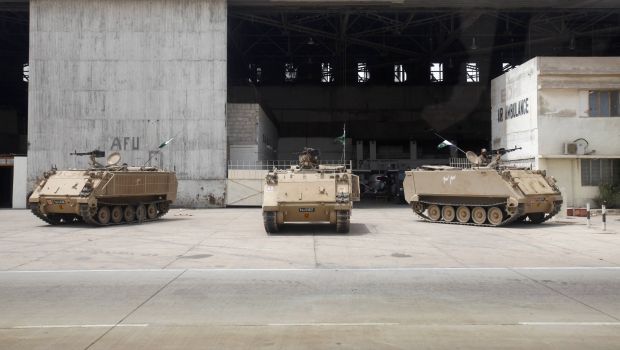
Pakistan Army armored personal carriers are seen at Jinnah International Airport after an attack by Taliban militants on Karachi, June 10, 2014 (Reuters/Athar Hussain)
The Taliban and ethnic Uzbek fighters holed up in North Waziristan—home to some of Pakistan’s most feared militants and Al-Qaeda commanders—have both claimed responsibility for last Sunday’s commando-style attack on Karachi airport.
The brazen all-night assault all but destroyed prospects of peace talks with the militants, who are fighting to topple the Pakistani government and impose a strict Sharia-based theocracy in the nuclear-armed nation.
“Our valiant armed forces have been tasked to eliminate these terrorists regardless of hue and color, along with their sanctuaries,” the army said in a statement.
“With the support of the entire nation, and in coordination with other state institutions and law enforcement agencies, these enemies of the state will be denied space anywhere across the country.”
It was not immediately clear where in North Waziristan, a mountainous ethnic Pashtun region on the Afghan border, the operation was taking place nor what kind of military equipment was being used.
The army has resorted to periodic air strikes against militant position but has not been involved on the ground.
Earlier on Sunday, fighter jets pounded militant hideouts in the region, killing at least 80 insurgents.
The army said ethnic Uzbeks accounted for most of those killed in the latest air assault.
It was not immediately known whether there were any civilian casualties. Journalists’ movements are restricted in the ethnic Pashtun region where the army has imposed a curfew.
“Fighter jets targeted militant hideouts in the village of Dagan near the Pakistani-Afghan border,” said one source in the regional capital of Miranshah.
“An important Uzbek commander, Abdul Rehman, has been killed in the air strike,” he said, adding that Rehman was directly involved in masterminding the Karachi airport attack.
Military sources said a number of ethnic Uighur militants, who operate alongside Uzbeks and share a similar Turkic language with them, had also been killed.
The official account could not be independently verified and there was no immediate comment from the Taliban.
China believes that Uighur separatists based in Pakistan’s tribal areas are behind an insurgency against Han Chinese in its restive Xinjiang province, although their exact numbers in Pakistan are unknown.
In anticipation of more violence, families have been fleeing North Waziristan into other parts of Pakistan as a climate of fear has gripped the lawless mountainous region.
After the Karachi attack, in which 38 people were killed, U.S. drones conducted the first air strikes in Pakistan since the start of the year, hitting militant positions.
Pakistani air force jets have also been pounding militant hideouts and there has been increased speculation that the army is preparing for a major ground and air offensive in the region.
Pakistani authorities also fear that militants themselves may be fleeing the area too, possibly into neighboring Afghanistan, making it harder to kill or capture them.
Officials said a curfew had been imposed in the region and the army was setting up more checkpoints to improve security.
